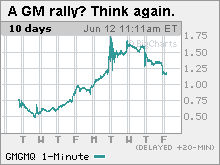GMGMQ isn't pretty in 'Pink'
Investors buying GM now won't cash in when it emerges from bankruptcy. Shares are on the Pink Sheets for a reason - they'll eventually be worthless.

 |
| Shares of GM have soared since the company filed for bankruptcy and moved to the Pink Sheets. But GMGMQ shares will eventually be canceled, meaning current shareholders will be wiped out. |
NEW YORK (CNNMoney.com) -- General Motors has been pretty active in its first two weeks as a bankrupt company.
GM has named former AT&T (T, Fortune 500) CEO Ed Whitacre as chairman. It's in talks to sell both its Saab and Hummer brands. And it has announced that Penske Automotive Group (PAG, Fortune 500), the car retailer run by auto racing legend Roger Penske, is buying Saturn.
So it's no wonder that shares of GM, which traded at 75 cents a share the day before the bankruptcy filing, have since shot up to about $1.20 a share, right? After all, the reorganization is going pretty smoothly, isn't it? Maybe GM's stock is a good buy now?
Wrong! Sorry to go all John McLaughlin on you, but anyone that is buying GM's new GMGMQ (GMGMQ) shares with the hopes of making a killing from them once the company emerges from bankruptcy is sorely mistaken.
GM is no longer listed on the New York Stock Exchange. It is now trading on what are known as the Pink Sheets, an over-the-counter market that many tiny, risky public companies with little Wall Street coverage and few major institutional investors call home.
The Q in GM's new ticker symbol is not there to be quirky or cool. It's a requirement in order to denote that GM is in bankruptcy.
However, I must confess that there is a nice sing-song ring to GMGMQ. Our main auto writer, Chris Isidore, has compared it to the EI-EI-O cadence of "Old MacDonald Had a Farm." Hmmm. Uncle Sam owned a Chevy. GM-GM-Q.
That little ditty actually works because once GM emerges from bankruptcy, it will issue new shares to its primary owners, and the biggest by far is the U.S. government.
A trust fund controlled by the United Auto Workers union, holders of GM bonds, the federal government of Canada and local government of the province of Ontario will be the other significant stakeholders.
Owners of current GM shares will not receive these new shares. In the bankruptcy pecking order, stockholders are pretty much last on the list. The SEC has a great explainer on its Web site
"Investors should be cautious when buying common stock of companies in Chapter 11 bankruptcy. It is extremely risky and is likely to lead to financial loss," the SEC says. "Although a company may emerge from bankruptcy as a viable entity, generally, the creditors and the bondholders become the new owners of the shares. In most instances, the company's plan of reorganization will cancel the existing equity shares."
GM itself sought to remind investors of this fact. On Wednesday, the company issued a short press release in which it said that "any recovery for the common stockholders in the Chapter 11 bankruptcy process is highly unlikely, even under the most optimistic of scenarios."
So the only reason to buy this stock now is if you want to try and make a profit from a quick trade. It is a speculative bet and not something that a buy-and-hold investor should own.
Talkback: Do you think GM can return to profitability after it emerges from bankruptcy? Leave your comments at the bottom of this story.
I'm a little worried that some investors still don't completely understand this though. On our site, GMGMQ has been one of the most actively looked up symbols during the past two weeks. Now I'm sure that part of that is due to the fact that there are lots of day traders that are moving quickly in and out of the stock.
But GM -- the old ticker -- has also routinely been one of the top ten looked up symbols as well. That leads me to believe that some readers are still interested in buying GM because they erroneously think that they can profit from the company's reorganization.
That's not going to happen. Yes, GM may one day emerge from bankruptcy as a leaner, more efficient company that's capable of generating profits.
And Chapter 11 is not a death sentence for a company. There are several recent examples of companies that have emerged from bankruptcy and done well in the next, uh, chapter of their corporate lives.
MCI was acquired by Verizon (VZ, Fortune 500) in 2006 for about $26 a share. So anyone that bought MCI when it began trading on the Nasdaq in July 2004 at $16.80 a share after emerging from bankruptcy was tickled pink.
And Kmart, which came out of bankruptcy in 2003 and started trading at $15 a share, is now trading at about $67 following its takeover of and subsequent name change to Sears Holding Corp (SHLD, Fortune 500).
But only investors in the new post-bankruptcy companies cashed in. Shareholders of MCI predecessor WorldCom, which wound up trading as WCOEQ on the Pink Sheets, were wiped out once that stock was canceled. Ditto for Kmart. Anyone that thought KMRTQ was a blue light special wound up with worthless paper.
So if you think auto sales are due for a rebound soon and want to profit from such a turnaround by buying GMGMQ think again. You're better off picking up shares of Ford Motor (F, Fortune 500) or Toyota Motor (TM).
And if you're really optimistic about GM's prospects once it exits bankruptcy, just sit tight and wait for the new GM to start trading -- although that's not likely to happen until sometime next year at the earliest.
Talkback: Do you think GM can return to profitability after it emerges from bankruptcy? ![]()

